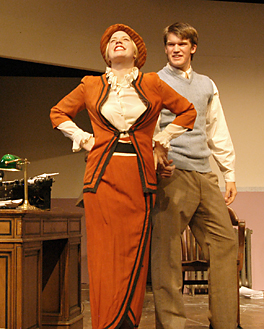
|
|
Vol. LXI, No. 39
|
|
Wednesday, September 26, 2007
|

|
|
Vol. LXI, No. 39
|
|
Wednesday, September 26, 2007
|
 TRUE LOVE, TRUE LITERATURE: Aspiring novelist Denis McCleary (P.J. Miller) and his beloved Rosamund Plinth (Veronica Siverd) share a moment of celebration. Their marriage prospects hinge on the publication of his sprawling novel manuscript in Theatre Intime’s production of Richard Greenberg’s “The Violet Hour,” playing through September 29. |
Richard Greenberg’s The Violet Hour is about a young publisher, John Pace Seavering, and two writers, Denis McCleary and Jessie Brewster, who desperately want to be published. The year is 1919. The Great War has just ended. The Jazz Age is about to begin.
Ambition and romance run high, as Denis, John’s buddy from college, needs to publish his massive unedited manuscript in order to win the woman he loves. Jessie, an aging African-American chanteuse involved in a steamy secretive affair with John, wants urgently to see her memoirs in print. John can afford to publish only one of the two manuscripts.
John’s relationships are complex. The passions are intense, the sentiments are sophisticated, and the dialogue is witty, delicate, and highly literate. This is challenging material for an inexperienced undergraduate company at Theatre Intime in its season opener. Credibility, commitment, chemistry, and diction fall short.
What should be a devoted friendship between John (Stephen Strenio) and Denis (P.J. Miller), a highly-charged erotic liaison between John and Jessie (Lianna Kissinger-Virizlay), and an ecstatically romantic infatuation between Denis and Rosamund Plinth (Veronica Siverd) are all a bit flat, less than convincing.
Keith Cochrane as the idiosyncratic office assistant Gidger lends a welcome frenetic energy and an element of unpredictable humor to the proceedings, and Ms. Siverd provides a buoyancy and appeal that at times imparts life and spirit to the production.
“The Violet Hour” runs September 27-29, with shows at 8 p.m. Thursday and Friday and 2 and 8 p.m. on Saturday. For tickets call 609-258-1742 or visit www.princeton.edu/utickets. For information visit www.theatreintime.org.
Mr. Greenberg’s artful, at times poetic, script provides the basis for these characters, which are loosely based on the singer Josephine Baker, the great Scribner’s editor Maxwell Perkins, F. Scott Fitzgerald (struggling in 1919 to find a publisher for his early version of This Side of Paradise) and Zelda, the woman young Fitzgerald must prove himself worthy to marry. Denis, midway in the first of two acts, waxes eloquent in describing the title of his novel, also The Violet Hour, which was inspired by the moment when he had just fallen in love (“Rosamund had happened”) at “that time — that wonderful New York hour when the evening’s about to reward you for the day — the violet light you walk between that hastens you places …. This is the violet hour!”
It is the actors, however, who must bring these sentiments, these characters, and their relationships to life, and often that does not happen here. Mr. Strenio’s publisher is very low key and inexpressive in his interactions with Denis, and there is no chemistry in his romance with Ms. Kissinger-Virizlay’s Jessie Brewster. With the performers on stage less than passionately engaged in these matters, it is difficult for the audience to care deeply about these characters and their dilemmas.
Mr. Miller looks the part of the handsome, charming writer and Princeton grad, but his character’s passions — for literature and for Rosamund — and many of his most lyrical lines get lost in murky diction and unclear focus.
As the romantic and literary conflicts heat up, the arrival of a strange machine throws a major disruption into the proceedings. At a furious rate this machine, tick-tick-ticking in the adjoining room, starts to produce stacks of pages revealing the characters’ lives in future years — all the way to the end of the twentieth century.
The audience watches as Gidger and John, in 1919, read with astonishment their strange futures viewed from a modern perspective. The play turns from an historical, literary romance into a fascinating and wistful glimpse of the power of destiny in shaping and shattering lives. Gidger, and especially John, must face the sad consequences of the choices they make.
The director, Princeton University sophomore Sophie Gandler, has chosen a rich, interesting, challenging play, but this production needs an infusion of energy and purpose. Shawn Fennell’s set, a rather bare publisher’s office, is sturdy, functional and adequate for the occasion. Mike Hasling’s lighting design and Heather May’s colorful period costumes effectively complement the proceedings.
The playwright, author also of Eastern Standard (1988) and Tony Award-winning Take Me Out (2002), was a 1980 Princeton University graduate.